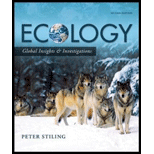General Ecology
BIOL 3200
Fall 2025
Basic principles governing the interaction of organisms and their environment including food webs, energy flow, biogeochemical cycles, factors controlling distribution and abundance, biological and species interaction, species diversity, ecosystem stability, ecological succession, and impact of man. Includes laboratory sessions.
Required Textbooks:
- Cite evidence for the ecological principles presented in class.
- Identify the steps of the scientific method in ecological literature, with particular emphasis on hypotheses and predictions.
- Identify the independent variable(s), dependent variable(s), and the subjects of an experiment.
- Identify ways to improve the design of scientific experiments.
- Synthesize and incorporate information from articles in peer-reviewed journals into class objectives.
- Demonstrate understanding and use of the scientific method and experimental design in actual field research studies (disciplinary learning; critical thinking).
- Work individually and in teams to plan and execute a physical, chemical and biological field survey. Project planning will include mission, goals, objectives, scope of work, tasks and timelines (social and personal responsibility; using resources; critical thinking).
- Incorporate knowledge, skill, precision and accuracy while performing the field experiments (disciplinary learning; using resources).
- Work safely, both individually and in teams, in a supervised, "real world" lab and field setting (disciplinary learning; social and personal responsibility).
- Demonstrate critical thinking skills through active participation in seminars, project planning, report writing and oral presentations of their research project (literacy; critical thinking; social and personal responsibility).
- Use previously learned problem solving, statistics and computer skills to evaluate and present results of applied field and lab exercises and experiments (critical thinking; using resources).
- Maintain accurate, insightful, and timely field notebooks and journals throughout the term (literacy).
- Creatively express themselves, both orally and in written form through field notebooks, journals, seminars, and written and oral presentations of formal research results (literacy; critical thinking; social and personal responsibility; using resources).
Library Resource Quick Search
Search our library resources by selecting an option below:
 Search Full Text Finder to find the full text of a publication.
Search Full Text Finder to find the full text of a publication.
If you see an embargo next to a e-journal title: An embargo period is a period of time which an official academic publication is not yet available online, either due to publishing restrictions or subscription contracts. Ex: "Embargo: 1 Year" = access begins one year ago from today's date.
If you have the DOI of an article, you can search for the article using DOI Tools.

|
Databases: search for articles, datasets, and videos on your topic |
|
|
View Databases by Subject OR All Databases |
|
 Search NSUWorks - NSU's Institutional Repository:
Search NSUWorks - NSU's Institutional Repository:
Browse or search scholarship in Digital Commons @ NSUWorks!

Find research tips, useful resources, and more by searching our LibGuides or browsing the topics below:
Oceanographic Campus Library Guides | Writing & Citation Style | Course Guides | Browse by Subject | How-To Guides | LibraryLearn : Short Video Tutorials | Razor's Research Bytes |

NSU Oceanographic Campus Library, 8000 North Ocean Drive, Dania Beach, Florida 33004
(954) 262-3699 | oclibrary@nova.edu | Hours | NSU Libraries
